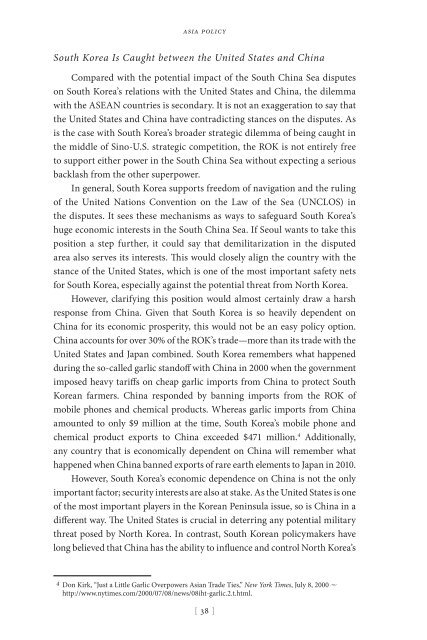Create successful ePaper yourself
Turn your PDF publications into a flip-book with our unique Google optimized e-Paper software.
asia policy<br />
South Korea Is Caught between the United States and China<br />
Compared with the potential impact of the South China Sea disputes<br />
on South Korea’s relations with the United States and China, the dilemma<br />
with the ASEAN countries is secondary. It is not an exaggeration to say that<br />
the United States and China have contradicting stances on the disputes. As<br />
is the case with South Korea’s broader strategic dilemma of being caught in<br />
the middle of Sino-U.S. strategic competition, the ROK is not entirely free<br />
to support either power in the South China Sea without expecting a serious<br />
backlash from the other superpower.<br />
In general, South Korea supports freedom of navigation and the ruling<br />
of the United Nations Convention on the Law of the Sea (UNCLOS) in<br />
the disputes. It sees these mechanisms as ways to safeguard South Korea’s<br />
huge economic interests in the South China Sea. If Seoul wants to take this<br />
position a step further, it could say that demilitarization in the disputed<br />
area also serves its interests. This would closely align the country with the<br />
stance of the United States, which is one of the most important safety nets<br />
for South Korea, especially against the potential threat from North Korea.<br />
However, clarifying this position would almost certainly draw a harsh<br />
response from China. Given that South Korea is so heavily dependent on<br />
China for its economic prosperity, this would not be an easy policy option.<br />
China accounts for over 30% of the ROK’s trade—more than its trade with the<br />
United States and Japan combined. South Korea remembers what happened<br />
during the so-called garlic standoff with China in 2000 when the government<br />
imposed heavy tariffs on cheap garlic imports from China to protect South<br />
Korean farmers. China responded by banning imports from the ROK of<br />
mobile phones and chemical products. Whereas garlic imports from China<br />
amounted to only $9 million at the time, South Korea’s mobile phone and<br />
chemical product exports to China exceeded $471 million. 4 Additionally,<br />
any country that is economically dependent on China will remember what<br />
happened when China banned exports of rare earth elements to Japan in 2010.<br />
However, South Korea’s economic dependence on China is not the only<br />
important factor; security interests are also at stake. As the United States is one<br />
of the most important players in the Korean Peninsula issue, so is China in a<br />
different way. The United States is crucial in deterring any potential military<br />
threat posed by North Korea. In contrast, South Korean policymakers have<br />
long believed that China has the ability to influence and control North Korea’s<br />
4 Don Kirk, “Just a Little Garlic Overpowers Asian Trade Ties,” New York Times, July 8, 2000 u<br />
http://www.nytimes.com/2000/07/08/news/08iht-garlic.2.t.html.<br />
[ 38 ]


